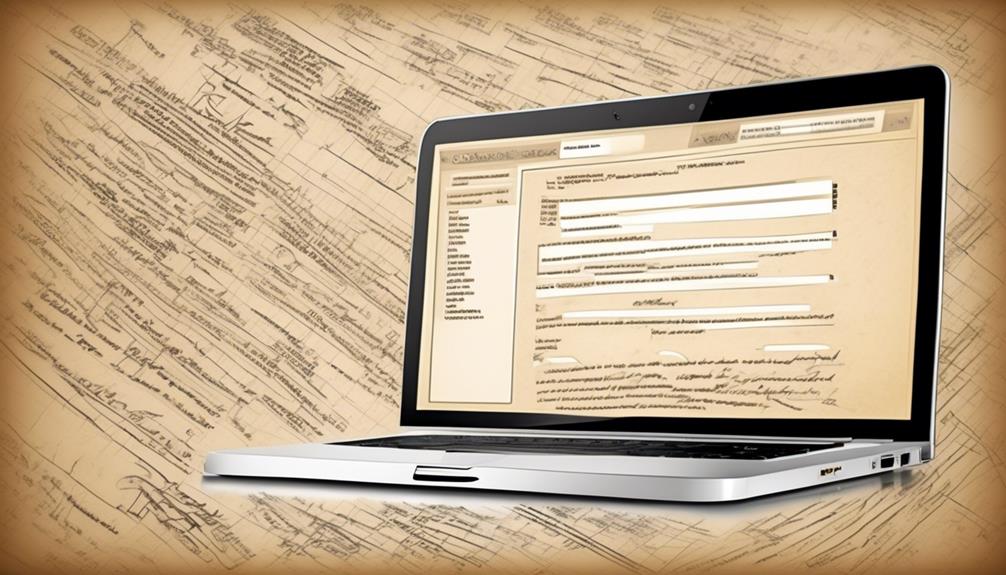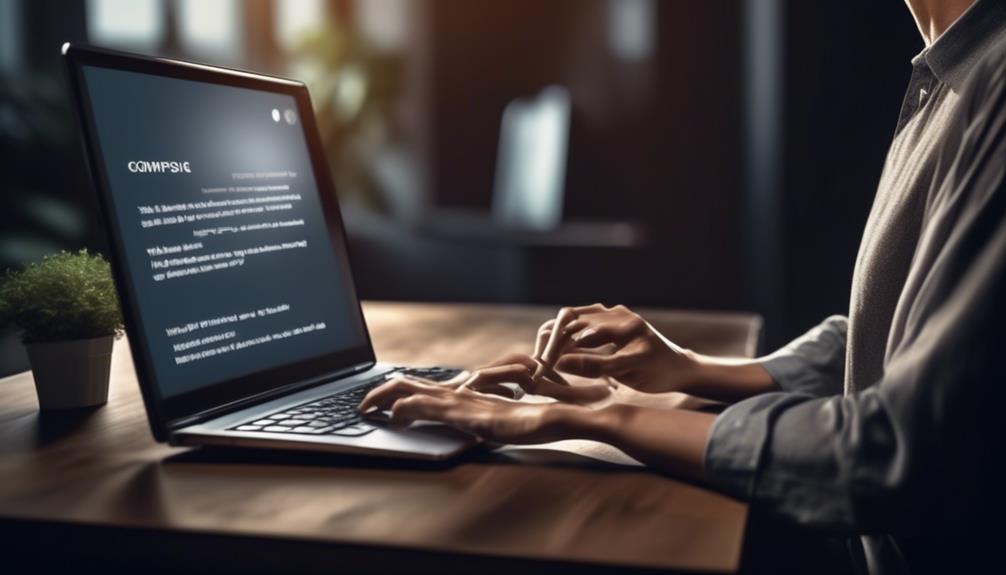When it’s time to seek help from a lawyer, it’s crucial to approach the situation with caution and make sure your email is crafted with the highest level of professionalism. It’s commonly understood that finding and communicating with legal advisors can be intimidating, and mastering the art of articulating your needs is fundamental.
So, how do we navigate this delicate process and craft an email that captures attention and conveys our needs in a clear and concise manner? Well, it all starts with establishing a professional tone and clearly outlining the purpose of our outreach.
But what other essential elements should be included in the email to ensure that our request receives the attention it deserves?
Key Takeaways
- Address the lawyer using their full name and professional title, and start with a professional greeting.
- Clearly state the purpose of the email in the subject line and be specific in stating your reason for reaching out.
- Include a brief description of your legal issue, specify the relevant practice area of law, and mention any pertinent documents or time-sensitive aspects.
- Include your full contact information, alternative contact methods if applicable, and links to professional social media profiles if relevant.
Crafting a Professional Greeting
We address lawyers using their full name and professional title, ensuring a formal and respectful tone in our communication. When crafting an email to a lawyer requesting legal assistance, it’s crucial to start with a professional greeting.
Opening with a brief introduction of ourselves and the purpose of the email sets the tone for the communication. Expressing respect for the lawyer’s expertise and mentioning a specific detail about their practice that impressed us can help establish a connection and demonstrate genuine interest in their work.
Clearly stating the purpose of the email, whether it’s seeking legal help, requesting information, or scheduling a consultation, is essential. This clarity helps the lawyer understand how they can assist us and streamlines the communication process.
Clearly Stating Your Purpose

Upon reviewing the guidelines for crafting an email to a lawyer, it’s essential to clearly and succinctly articulate the purpose of your communication in the subject line. When reaching out to a lawyer for assistance, it’s crucial to be clear and concise in your subject line to capture their attention and communicate the essence of your email. To achieve this, consider the following:
- Be Specific: Clearly state your reason for reaching out, such as ‘Request for Legal Consultation’ or ‘Seeking Legal Advice on Property Dispute’.
- Include all Relevant Information: Briefly summarize your legal issue in the subject line, ensuring that the lawyer understands the nature of your inquiry.
- Request for Legal Assistance: Use the subject line to express your need for legal help, such as ‘Urgent Legal Matter Requiring Immediate Attention.
Providing Specific Legal Details
After clearly stating the purpose of your email in the subject line, the next crucial step is to provide specific legal details that will aid the lawyer in understanding and addressing your legal needs effectively. When writing to a lawyer requesting services, it is essential to provide information that allows them to grasp the nature of your legal matter. Below is a table that outlines the key elements to include when seeking representation.
| Information | Details |
|---|---|
| Brief Description | Summarize your legal issue concisely. |
| Practice Area | Specify the area of law relevant to your case. |
| Documents Related | Mention any pertinent documents that support your case. |
| Urgency | Indicate if there are time-sensitive aspects to your matter. |
Including Contact Information

Incorporate essential contact details into your email signature to facilitate seamless communication and provide multiple avenues for reaching out. When reaching out to a lawyer for help with your legal needs, it’s crucial to include the necessary contact information in your email signature. Here are some key points to consider:
- Include your full name, law firm name, position, professional contact number, and email address to ensure that the lawyer can easily identify and reach out to you.
- Provide alternative contact methods, such as a secondary phone number or a direct line, to facilitate easy communication and ensure that the lawyer can reach you using your preferred method.
- If applicable, include links to your professional social media profiles, such as LinkedIn, to provide additional contact options and enable the lawyer to learn more about you.
Concluding Professionally
We greatly appreciate your time and consideration in addressing our legal needs and look forward to discussing the next steps with you. Your expertise in legal services is invaluable to us, and we’re eager to arrange a consultation or meeting to further delve into our case and seek your professional guidance.
Should you require any additional information or documents to facilitate the process, please don’t hesitate to let’s know. We’re committed to providing all necessary details to assist in your understanding of our situation.
We believe that your insight and assistance will be instrumental in resolving our legal questions and providing the help we require. Your professional guidance is of utmost importance to us, and we’re eager to move forward under your esteemed advisement.
We look forward to the opportunity to discuss our legal matters in further detail and eagerly anticipate the prospect of working with you. Thank you for your time and attention to this matter.
Sincerely,
[Your Name]Frequently Asked Questions
How Do You Write a Formal Email to a Lawyer?
We write a formal email to a lawyer by addressing them with respect and clarity. We express our purpose directly and provide necessary details in a professional manner.
It’s important to maintain a formal tone and use proper salutations and closings. Conciseness is key to ensure clarity and respect for the recipient’s time.
We aim to convey our message effectively while upholding professionalism and etiquette throughout the email.
How Do You Email an Attorney for a Consultation?
When we email an attorney for a consultation, we express our legal needs and suggest potential meeting times.
For example, ‘We would like to discuss our business’s legal matters and are available for a consultation next Tuesday at 10 am.’
This approach communicates our eagerness to address legal needs and respects the attorney’s schedule.
It sets a professional tone and shows our readiness to engage with the attorney.
How Do I Write a Letter Requesting Legal Representation?
We approach writing a letter requesting legal representation with a professional and respectful tone, clearly outlining our situation and the assistance we seek.
It’s crucial to provide all relevant details and documents, ensuring the lawyer has a comprehensive understanding of the case.
We express our eagerness to collaborate and emphasize the importance of their expertise.
Maintaining transparency and clarity in our communication is essential to establish a strong foundation for the attorney-client relationship.
Do Lawyers Respond to Emails?
Yes, lawyers do respond to emails. In fact, they often prioritize electronic communication due to its efficiency.
We find that crafting a well-written email, utilizing a clear subject line, and providing pertinent legal details greatly increases the likelihood of a prompt response. Including contact information and availability for a consultation also facilitates a lawyer’s ability to reply.
Conclusion
We sincerely hope that our email has conveyed the urgency and complexity of our legal matter. Your expertise and guidance would be invaluable in navigating this daunting situation.
We greatly appreciate your time and consideration in reviewing our case. Your reputation for exceptional legal acumen precedes you, and we’re confident that your assistance will be nothing short of a game-changer for our predicament.
We eagerly await your response.
Thank you for your attention to this matter.









